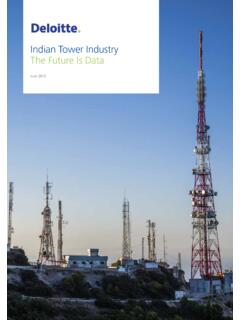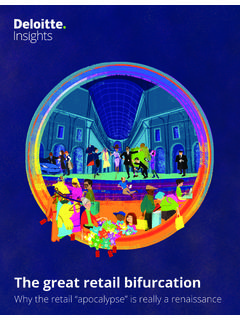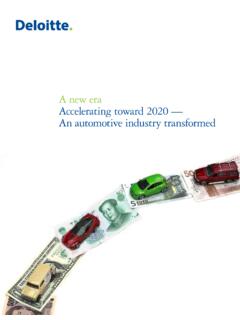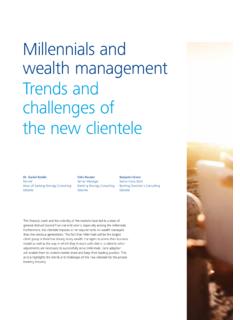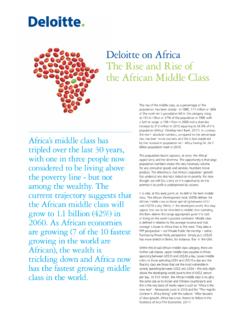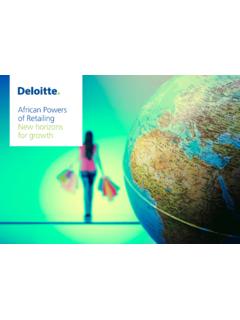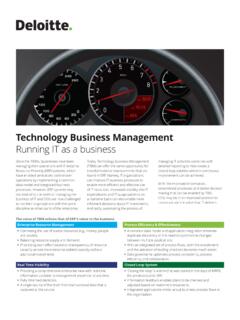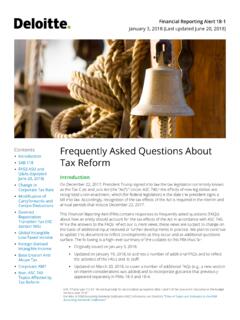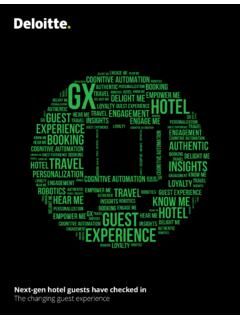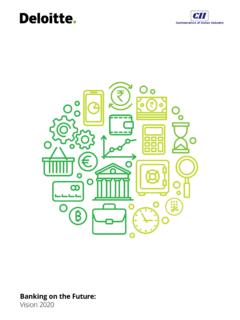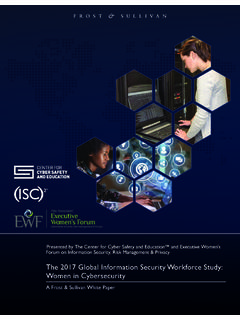Transcription of 2018 Deloitte Millennial Survey Millennials …
1 2018 Deloitte Millennial Survey Millennials disappointed in business, unprepared for industry Table of contentsExecutive summary: A desire for reassurance 1 Survey methodology 3 Are Millennials losing faith in business? 5 Diversity defined 10An opportunity for leaders 13 Outlook for the world and themselves 14 Loyalty, turnover and the pull of the gig economy 17 Empowerment and development in a digital world 22 Conclusion: What do young workers want? 27 References 281 2018 Deloitte Millennial SurveyExecutive summary: A desire for reassuranceTo prosper over time, every company must not only deliver financial performance, but also show how it makes a positive contribution to society.
2 Companies must benefit all of their stakeholders, including shareholders, employees, customers and the communities in which they CEO Larry Fink1 The Millennial generation is feeling uneasy about the future. The growth of industry technologies from robotics and the internet of things to artificial intelligence and cognitive has altered the nature of work, while political upheavals challenge the established world order. In this environment, Millennials and Gen Z yearn for leaders whose decisions might benefit the world and their on last year s report,2 the seventh annual Deloitte Millennial Survey delves into respondents perceptions of the evolving threats and opportunities in an increasingly complex world.
3 For the first time, the Survey also includes opinions of Generation Z3 those following Millennials into the a fragmenting social and political environment, with industry driving profound changes, many Millennials are exhibiting a marked desire for reassurance. They feel pessimistic about the prospects for political and social progress, along with concerns about safety, social equality and environmental sustainability. While young workers believe that business should consider stakeholders interests as well as profits, their experience is of employers prioritizing the bottom line above workers, society and the environment, leaving them with little sense of loyalty.
4 2 2018 Deloitte Millennial SurveyAmong this year s key findings: Perceptions of business are heading south. Millennials opinions about business motivations and ethics, which had trended up the past two years, took a sharp turn downward. There continues to be a stark mismatch between what Millennials believe responsible businesses should achieve and what they perceive businesses actual priorities to be. Diversity and flexibility are key to loyalty. Good pay and positive cultures are most likely to attract both Millennials and Gen Z, but diversity/inclusion and flexibility are important keys to keeping them happy.
5 Many respondents, especially in emerging markets, view the gig economy as an attractive alternative or adjunct to their jobs. Young workers feel unprepared for industry Millennials expressed admiration for corporations that are adapting to and advancing industry and developing their people to succeed in this evolving business environment. Respondents lack confidence that they can succeed in an industry environment and are looking to businesses to help them develop the necessary skills, including the soft skills they believe will be more important as jobs seen in previous surveys, companies and senior management teams that are most aligned with Millennials in terms of purpose, culture and professional development are likely to attract and retain the best Millennial talent and, in turn, potentially achieve better financial performance.
6 Loyalty must be earned, and the vast majority of Millennials are prepared to move, and move quickly, for a better workplace message is clear: Young workers are eager for business leaders to be proactive about making a positive impact in society and to be responsive to employees needs. Millennials want leaders to more aggressively commit to making a tangible impact on the world while preparing their organizations and employees for the changes that industry is effecting. One silver lining is that far more Millennials believe that business leaders are making a positive impact on the world than government or religious leaders.
7 Even so, four in 10 respondents see business leaders having a negative impact. Therefore, the timing is ideal for business leaders to step up and take actions that benefit all of their stakeholders. 3 2018 Deloitte Millennial Survey3 2018 Deloitte Millennial SurveySurvey methodologyThe 2018 report is based on the views of 10,455 Millennials questioned across 36 countries. Millennials included in the study were born between January 1983 and December 1994 and represent a specific group of this generation those who have college or university degrees, are employed full time and work predominantly in large, private-sector Millennials are increasingly taking on senior positions in which they can influence how their organizations address society s challenges.
8 This report also includes responses from 1,844 Gen Z respondents in Australia, Canada, China, India, the United Kingdom and the United States. Gen Z respondents were born between January 1995 and December 1999. All are currently studying for or have obtained a first/higher degree. More than a third are working either full time (16 percent) or part time (21 percent).10,455 Millennials (born between January 1983 and December 1994)1,844 Gen Z(born between January 1995 and December 1999)4 2018 Deloitte Millennial SurveySurvey methodology (cont.)EMERGING MARKETSI nterviews conducted: Millennials : 4,613 Gen Z: 613 Argentina | 300 Brazil | 307 Chile | 312 China | 523 | 310 Colombia | 305 India | 309 | 303 Indonesia | 306 Malaysia, Thailand and Singapore | 321 Mexico | 301 Peru | 203 Poland | 303 Russia | 302 South Africa | 202 The Philippines | 311 Turkey | 308 DEVELOPED MARKETSI nterviews conducted: Millennials : 5,842 Gen Z.
9 1,231 Australia | 502 | 318 Belgium | 201 Canada | 525 | 300 France | 507 Germany | 406 Ireland | 202 Italy | 306 Japan | 429 New Zealand | 209 South Korea | 313 Spain | 300 Switzerland | 193 The Netherlands | 312 The Nordics (Denmark, Finland, Norway, Sweden) | 402 United Kingdom | 514 | 301 United States | 521 | 312 Total number of interviews: Millennials : 10,455; Gen Z: 1,844 Indicates a Gen Z market 5 2018 Deloitte Millennial SurveyFigure 1. Millennials views of corporate motives dimPercent of Millennials who say Thinking about businesses around the world, would you agree or disagree that, on balance, the following statements describe their current behavior?
10 Base: All Millennials 10,455* They have no ambition beyond wanting to make money not asked in 201554%201620172018 They have no ambition beyond wanting to make money*50%48%62%34%44%2015201620172018 Their leaders are committed to helping improve society53%57%39%62%34%47%47%44%201520162 0172018 They behave in an ethical manner52%58%65%48%45%30%37%44%2030405060 70802015201620172018 They focus on their own agendas rather than considering the wider society75%75%64%59%23%33%38%21%203040506 070802030405060708020304050607080 Back in 2014, Deloitte asked Millennials what they thought about business' motivations and ethics.
